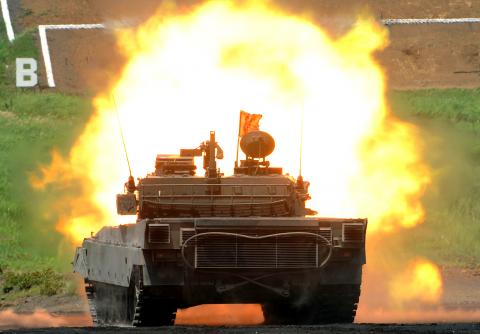|
Japan to bolster its
military, boost Asia ties to counter PRC
Reuters, TOKYO

Picture taken on August 20, 2013
shows Japanese Ground Self-Defense Forces tanks firing during an annual live
fire exercise at the Higashi-Fuji firing range in Gotemba, at the foot of Mt.
Fuji in Shizuoka prefecture. Japan unveiled plans to boost defence spending to
240 billion USD over five years to deploy amphibious vehicles, drones, Osprey
aircraft to respond dynamically to perceived threats from China and North Korea
yesterday.
Photo: AFP
Japan will boost its military spending in
coming years, buying early-warning planes, troop-carrying aircraft and
beach-assault vehicles, while seeking closer ties with Asian partners to counter
a more militarily assertive China.
The planned 2.6 percent increase over five years, announced yesterday, reverses
a decade of decline and marks the clearest sign since Japanese Prime Minister
Shinzo Abe took office a year ago that he wants a bigger military role for Japan
as tension flares with China over islands they both claim.
Abe¡¦s top priority has been reviving a long-sluggish economy, but he has also
pledged to strengthen Japan¡¦s military and boost its security profile to meet
what he says is a threat from China¡¦s rapid military buildup and recent actions
to back its claims to Japanese-held islands in the East China Sea.
¡§China is attempting to change the status quo by force in the skies and seas of
the East China Sea and South China Sea, and other areas, based on its own
assertions, which are incompatible with the established international order,¡¨
Japan said in its first national security strategy, one of three plans approved
yesterday. ¡§China¡¦s stance toward other countries and military moves, coupled
with a lack of transparency regarding its military and national security
policies, represent a concern to Japan and the wider international community and
require close watch.¡¨
Abe¡¦s government also vowed to review Japan¡¦s ban on weapons exports, a move
that could reinvigorate struggling defense contractors such as Mitsubishi Heavy
Industries Ltd and Kawasaki Heavy Industries Ltd.
The policies, including a five-year military buildup and a 10-year defense
guideline, call for stronger air and maritime surveillance capabilities, and
improved ability to defend far-flung islands through such steps as setting up a
marine unit, buying unarmed surveillance drones and putting a unit of E-2C
early-warning aircraft on Okinawa.
Japan will budget ¢D23.97 trillion (US$232.4 billion) over the coming five years
for defense, up from ¢D23.37 trillion the previous five years. Under current
procurement practices, the five-year spending would have been ¢D24.67 trillion,
but the government expects to save ¢D700 billion from streamlining procedures to
cut costs, officials said.
Military spending had fallen for 10 years until Abe boosted the defense budget
0.8 percent this year. The Japanese Defense Ministry is seeking a 3 percent rise
in the year from next April, the biggest increase in 22 years, although much of
the growth reflects higher import costs due to a weaker yen.
Japanese Defense Minister Itsunori Onodera denied that the plan was aimed at any
country vital.
¡§This is a country [China] with which we aim to have a strategic, mutually
beneficial relationship. It is also a country we have deep ties economically,
historically and culturally. It is important for ties with this important
country to improve further,¡¨ Onodera said.
China¡¦s Xinhua news agency said the measures were clearly aimed at China and it
warned Japan against ¡§big-power geopolitics.¡¨
¡§If Japan really hopes to return itself to the ranks of a ¡¥normal country,¡¦ it
should face up to its aggression in history and cooperate with its Asian
neighbors, instead of angering them with rounds and rounds of unwise words and
policies,¡¨ Xinhua said.
|
![]()
![]()
![]()